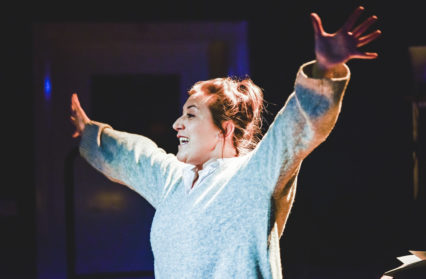Emily Garside reviews the latest Dirty Protest production, How To Be Brave, a slice of life play which highlights working class women’s voices.
There is much to be commended about Dirty Protest’s work over the last decade; at the centre of their raison d’être is new work, experimentation, and giving a platform to Welsh writers. How to Be Brave is no exception on all three of those fronts. It does what Dirty Protest does best – and what other companies could learn from – and puts the writing, and the storytelling at the heart of the work. Siân Owen has produced an engaging, fierce and, yes, brave play that puts women and working-class voices front and centre, and she has done it with a funny narrative that theatrically is a joy to watch.
Presented in the round, Catherine Paskell has directed the piece to feel inclusive of the audience but not intrusive. In acknowledging its own theatricality, by bringing the audience into Owen’s world, the direction includes, engages and welcomes (quite literally in fact) the audience to be a part of the story. Supported by Cory Shipp’s clear and effective design which focuses the action and allows Paskell’s direction and Laura Dalgleish’s powerhouse performance as Katie to run at breakneck pace. And run it does. Dalgleish jumps in and grabs both the story and the audience from the outset. She is funny, veering from dry wit delivery to all out-comedy dance routine seamlessly. It’s a fearless and often quite raw performance that matches Owen’s honest writing beat for beat. But Dalgleish is also a sensitive and intelligent performer and between her and Paskell they’ve teased out all the nuances of the writing to create a powerful piece that also entertains.
How To Be Brave is a Newport play through and through, and it has much to teach other writers, directors and perhaps even TV producers, what it is to laugh along with the eccentricities of one’s hometown, rather than at it. The piece is full of humour, wry observations about Newport and the characters that make it up. It’s not above poking fun at the more ridiculous elements (there is a particular pride in a certain Garden Festival clock that sometimes defies belief). How To Be Brave is imbued with a certain brand of Welshness – Newportness even, that’s self-aware, able to laugh at itself, but with love and respect. For a Welsh writer to stand up and say ‘this is who we are, and yes we can have a laugh at ourselves’ at a time when writers from outside too often just want to laugh at us – that’s a pretty brave move too.
Along with its Newport authenticity, How to Be Brave offers up working class voices without it ever becoming a ‘Working Class Issues’ play. We hear about the steelworks, but don’t spend a play reflecting on how grim life is for steelworkers; we know nan lives in a prefab but it’s a part of life, not some outside-looking-in way to make us feel sorry for her. And that’s the key to telling working class stories – give the writers a platform and representation natural comes with it. How To Be Brave is a funny, endearing slice of life, that will resonate with audiences who come from this sort of ‘world’ and will undoubtedly also appeal to people outside the ‘theatre bubble’.
Owen saves her real bravery for where it counts, and where you find it most: women. How To Be Brave is filled with fierce female voices; unmediated and unfiltered there’s a true honesty to Katie. It’s a play about being brave. But it’s a play about women being brave specifically. And the ways in which women have to be brave. And that, in this play, is of course linked to motherhood. But much like the way Owen approaches class, motherhood is central too, but not exclusively the story. There’s a subtle tying together of the generations through Owen’s writing through that shared experience of mothering. And it’s a wonderfully touching moment when Katie says, ‘I miss Nan’, and her mum responds that she does too. The unspoken shared experience both between them and the women of the audience, is striking. And while Owen is writing a piece about motherhood, it thankfully doesn’t exclude those women who aren’t mothers. Instead it embraces the elements of motherhood we see in all women – and the expectations around them.
A review shouldn’t have to comment on the fact that a piece, centred on a woman, on a woman being funny, talking about class, talking about motherhood, talking about where she’s from, still feels unusual, still feels brave. And yet, until all this is the norm it feels important to draw attention to it. How To Be Brave is a funny, intelligent, honest piece of theatrical storytelling.
How To Be Brave is on tour now
(Image credit: Kirsten McTernan)
You might also like…
Dylan Moore provides an in-depth review of The Real Valleys, Dirty Protest’s meta comeback to the MTV reality show The Valleys.
Emily Garside is a regular contributor to Wales Arts Review.












